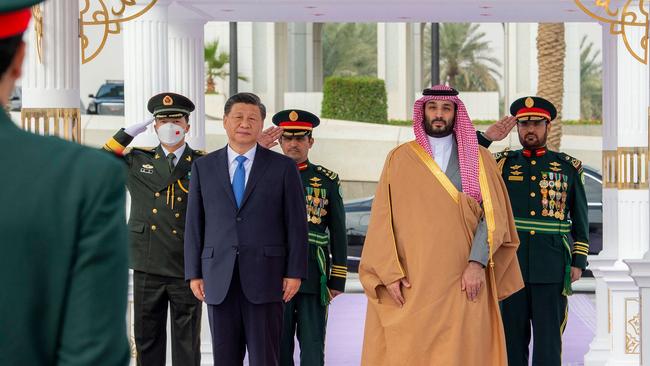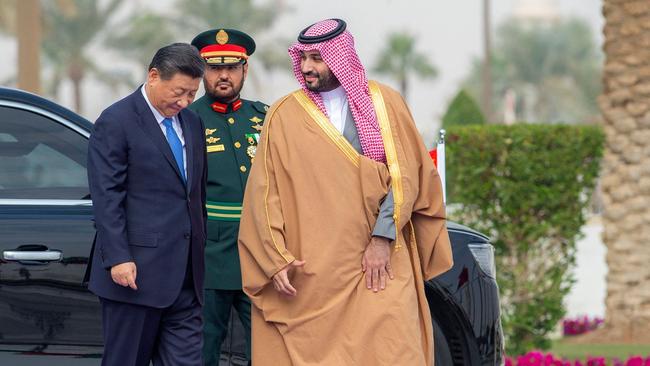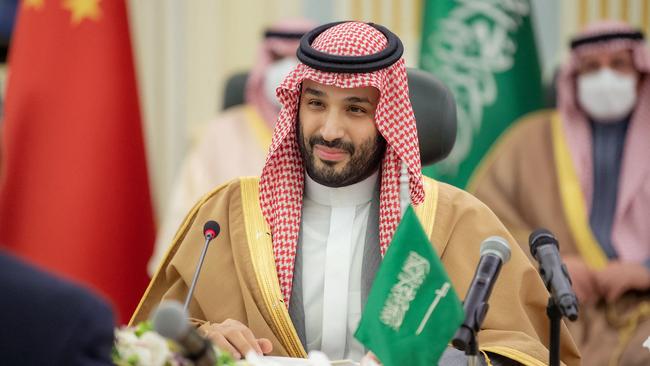Pursuit of power unites China’s Xi Jinping and Saudi Arabia’s Mohammed Bin Salman

Mr Xi can expect an extravagantly warm welcome from MBS, as the crown prince is known. The pomp and ceremony will boost Mr Xi’s stature back home, where he faces protests over Covid lockdowns, a stagnant economy and his assumption of an unprecedented third term as China’s leader. MBS similarly benefited from Mr Xi’s warm welcome in Beijing in 2019 on the heels of the murder of Jamal Khashoggi. An aide to the crown prince says of that visit, “MBS managed Trump, but he meshed with Xi.”
For MBS, everything looks rosy now. World leaders are eager to meet with him again. The Saudi economy is among the world’s fastest growing this year, and the national oil company reported a 90 per cent increase in second quarter profits. Atop all that, he’s basking in the Saudi soccer team’s upset victory over Argentina at the World Cup.

China and Saudi Arabia established diplomatic ties in 1990. In 2006 the late King Abdullah became the first Saudi ruler to visit Beijing, and the relationship has warmed recently as Riyadh has started to doubt the durability of its alliance with America. While the US remains the kingdom’s largest arms supplier, China has become its major trading partner, entirely as a result of large imports of Saudi oil. Each has invested billions in the other’s country and more doubtlessly will be announced this trip.
Both leaders see themselves as symbols of proud and ancient civilisations that are superior to the West. They are deeply offended by Washington’s assertion that individual liberty and human rights are universal. Mr Xi can be confident he’ll hear nothing during this visit about China’s treatment of its Uyghur population, which the US has labelled genocide. Nor will Mr Xi lecture MBS on the war in Yemen.
Beyond common national interests, the two men share stylistic similarities. Both are dreamers with grandiose goals. Mr Xi has spoken passionately of the “Chinese Dream” from the moment he ascended to power in 2012. He promises to rejuvenate his once-great civilisation fully by 2049, the 100th anniversary of the Communist takeover of China.
MBS’s Vision 2030 is similarly ambitious. He seeks to transform his oil-dependent nation into a technological powerhouse drawing the world’s most innovative citizens to a space-age city he is building for $500 billion in the desert.
Both leaders can marshal public and private resources at their whim because their citizens are largely submissive. Confucianism, China’s guiding ethical system, teaches loyalty to one’s family and then the emperor. Islam, too, teaches obedience to family and, above all, to Allah. In Saudi Arabia, the king is Allah’s earthly representative, and so he must be obeyed. So complete is the two men’s control that each is labelled “Mr Everything” by his citizens.
Beyond these historic precepts of obedience, both have ruthlessly eliminated opposition under the pretext of dealing with corruption. In 2017, MBS brazenly locked up scores of royal relatives and prominent citizens in a hotel on charges of hiding illicit wealth. Most were released eventually after forfeiting a collective $100 billion to the government. But many are still under house arrest, unable to leave the kingdom.

Mr Xi has exhibited similar harshness. Over the past decade he has purged vast numbers of political rivals. With television cameras rolling in October he had his predecessor, Hu Jintao, marched out of a Communist Party conference.
Both men oversee sophisticated, pervasive internal intelligence systems. Saudis, already increasingly reluctant to speak, will do so only in the absence of cellphones. Digital currency and even more intrusive surveillance allow the Chinese government to track every move of citizens, who are assigned a “social credit” score that measures their “trustworthiness” and metes out punishments and privileges accordingly. China’s internal-security budget is nearly as large as its rapidly growing defence budget.
Mr Xi appears increasingly confident that China will one day displace the US as the pre-eminent global leader, and MBS is riding high after a wave of wins. Yet both leaders face serious economic challenges, including high rates of youth unemployment in both countries. And public swagger on the red carpet is one thing. Private choices tell a more nuanced story: China’s president sent his only daughter to Harvard, and the Saudi crown prince’s five children study Chinese and English.
Ms House, a former publisher of The Wall Street Journal, is author of “On Saudi Arabia: Its People, Past, Religion, Fault Lines — and Future.”
The Wall St Journal



Xi Jinping and Mohammed bin Salman are meeting this week in Riyadh. At first glance, the president of China and the Saudi crown prince appear to have little in common beyond their shared conviction that America is in decline. But a closer look reveals numerous similarities, especially their assertive determination to play a dominant role in world affairs.